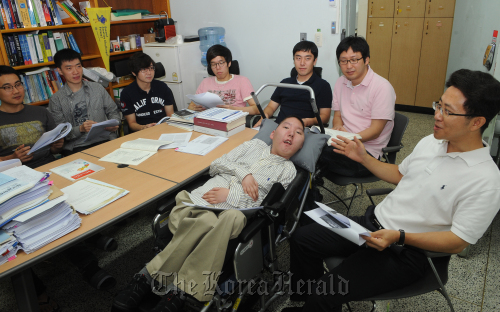The most basic of tasks such as breathing and turning a book’s pages are a constant struggle.
Shin is unable to walk or write because his muscles have been weakened by the spinal muscular atrophy he has suffered since he was one. His muscles have degenerated to the point that he is completely immobile because of the rare disease. The last time he wrote a letter by himself was the third grade in elementary school.
For Shin, the world seems like one uphill struggle after another as his muscles weaken as time passes. Still, he bravely confronts the world to seek his own happiness.
“Many people would ask ‘why don’t you just stay at home and rest?’ or said ‘your health is more important than study.’ But if I just lay on bed at home worrying, could I be happy?” Shin said in an email interview with The Korea Herald.
He graduated from Yonsei University Department of Computer Science early this year. In July, he started to work as a researcher at the university’s Research Center for Software Application.
It took him nine years to receive an undergraduate diploma from the normally four-year university course. However, except for the long time on campus, his was not that different from other students’ college lives. He studied hard to score high credits and land a job after graduation.
If there is anything that sets him apart, it would be that he gained the favor of the engineering department dean thanks to his passion for computer science and mathematics and particularly his steely willpower to study despite severe physical constraints.
Shin took math as a double major. When everyone around him suggested he give up trying to double major in such a difficult subject, he just smiled.
Great motherhood
Had it not been for his mother, it would have been impossible for him to complete the college course.
Lee Won-ok, 65, has been her son’s hands and feet over the last 21 years both on and off campus. She carried him to every classroom he attended, turned the pages of the books he read and wrote exam answers for her son.
“Writing answers on the test sheets had not been a big problem before he entered college. But, writing complex answers to math questions was one of the hardest parts,” Lee recalled.
She had to wait outside while her son was in a classroom, because he might need her help urgently anytime. When her legs hurt as she waited standing up for long, she would briefly sit on the narrow windowsill. She moved him to the next class during the10-minute breaks by pushing his wheelchair while toting his bag and her own belongings.
The real hard job for her was not caring for him, though. She was visited countless times by a sense of despair and fear about his future.
On graduation day, Yonsei conferred on her an honorary diploma in recognition of her great motherhood and devotion to her disabled son.
“She has been with me 24/7 ― taking me to schools for 21 years whether it’s raining or snowing and taking care of me when I’m sick. If it were not for my mother’s love, I would not be able to graduate,” said Shin.
“Hyung-jin has never complained that studying is hard. He’s a bright, positive child,” Lee said.
Though he missed half the classes in elementary school due to health problems, he excelled in the last exam for sixth graders. When everyone told him he did not have to take a placement test in the middle school, he chose to take it anyway.
“He chalked up pretty good scores whenever he took exams. It has given me courage. It seemed like his excellent academic performance has repaid my sweat and tears.”
“He has been always good at math, doing most arithmetic in his head as he can’t write on paper.”
Technology has changed his life ― and his mother’s life as well. He uses an eye-controlled mouse and screen keyboard. With eye blinks, he can read and type.
His mother does not turn book pages for him any longer as a Yonsei University support center for students with disability scans books and sends them to him.
With the help of technology, he can do more things all alone, including programming for projects, research and communication.
And technology has given him some privacy from his caregivers, too.
“Without this kind of technology, imagine how embarrassing it would be if I want to tell my girlfriend ‘I love you.’” Shin said in a recent lecture to Microsoft Korea employees.
He plans to enter the graduate school at Yonsei next year to study computer science in depth.
“I want to develop a technology that will change the lives of people with disabilities,” said Shin. “My goal is to narrow the information gap between the able bodied and the disabled through technology and help disabled people connect to the world.”
Shin stressed that people with disabilities have the right to pursue their dreams and that they should do so. He believes that by contributing to society, he can return the love he has received from his mother.
“No matter what kind of hardship lies ahead, I hope they find what they want and what they should do. Dreams come true for those who seek them,” Shin said.
By Lee Woo-young (
wylee@heraldcorp.com)








![[Today’s K-pop] Blackpink’s Jennie, Lisa invited to Coachella as solo acts](http://res.heraldm.com/phpwas/restmb_idxmake.php?idx=644&simg=/content/image/2024/11/21/20241121050099_0.jpg)